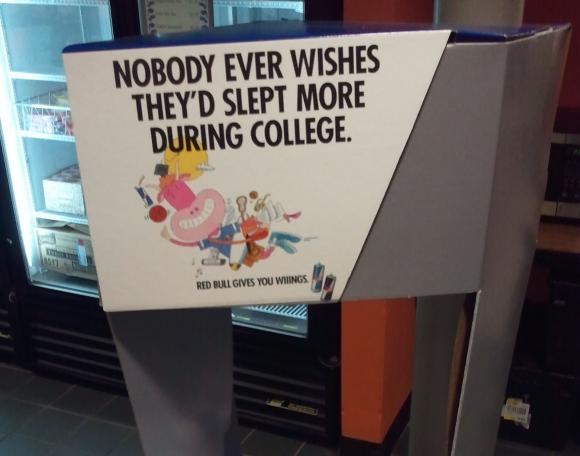Some advertisers routinely entreat us to undermine our health, but rarely through overt attacks on healthy behavior. When one such unhealthful message assaulting sleep reached my university’s campus this fall, I began to hear about it from offended and sympathetic colleagues. One saw it in her freshman daughter’s dorm. Another saw it in a campus convenience store. The makers of the energy drink Red Bull advised students that “Nobody ever wishes they’d slept more during college.”
Decades of studies about the neurological and psychiatric importance of sleep in teens and young adults indicate that this “advice” is rubbish. Unlike the drink maker’s aluminum cans, it should never be recycled.
In adolescents — and younger college students, according to recent data from my lab — sleep is a neurologically important process during which the fast-growing brain becomes better organized. Many neural connections forged earlier in life during rapid growth are pruned away if they are no longer needed, and new pathways are established to the parts of the brain that are responsible for such things as planning, organizing, and abstract thinking.
Adequate sleep has implications not only for proper brain development but also for immediate behavior and safety. The list of negative outcomes associated with insufficient sleep goes well beyond merely feeling tired. A recent study of college students in Texas indicated that 16 percent of the participants reported falling asleep at the wheel. A study published by a researcher in my lab, Kathryn Orzech, found that college students who report inadequate sleep also report lower grades and more trouble with coursework. Still other studies have found an association between poor sleep and elevated alcohol use. The literature also supports associations between poor sleep and depressed mood and poorer physical health.
Any one of those outcomes should be enough to make a student wish he or she had slept more in college.
To be fair to the advertiser and its fun-loving sentiment, there really are a lot of opportunities for college students to have a good time. If students were getting enough sleep, they probably would miss out on some fun. But many studies, including Orzech’s, have found that on average, young college students are not within shouting distance of the amount of sleep clinicians believe to be healthy. I tell my students that they should get about eight and a half hours of sleep every night, but a recent study found that students on average are getting nearly an hour less than that. I’ll make that more explicit: College students should sleep more.
The well-substantiated finding that adolescents go to bed later and later as they age is not the fault of advertising. In fact, it is quite natural for older teens to stay up later — about 90 minutes or so — than younger ones. But the need for sleep doesn’t change. Unfortunately, because many high schools start too early and assign a lot of homework, teens lose sleep simply because they are caught between two immutable forces: biology and the school schedule. That’s probably why one lesson that college students learn quickly is to avoid early classes.
Other activities limit sleep as well, including texting, tweeting, and Facebooking in bed, which can keep students awake by producing light and causing social stimulation. (Studying late at night also involves light, although it is surely not as stimulating as is social networking.) Once teens get to college, whatever help their parents still provided to set a bedtime, or at least to encourage sleep, is no longer available. Students are left to exercise their judgment about when to sleep, and their decisions are based more on what to do while awake than when to sleep.
Advertising slogans that mock the choice for healthy sleep, and then deliver on that message with such chemical stimulants as caffeine, are certainly not helping. Caffeine is no more a substitute for sleep than are CliffsNotes for reading original works of literature.
What will help, though, is education. Working with her former colleagues at the University of Arizona, Orzech found that a campus advertising campaign costing a mere $2,500 helped improve the sleep of about 10 percent of the students who saw it. It is also important to staff health — and psychological — services offices with people who are aware of the importance of sleep.
Although they suffer because of it, many students can at least get by with not getting enough sleep. But it is especially important that those who are struggling academically, medically, or psychologically receive guidance on how to improve their sleeping habits.
Students (and parents and educators) who think that sleep is directly related to mental health, academic performance, and personal safety will be better armed when faced with competing pressures, such as advertising.
Perhaps we’ll someday hear of students referring to an “all nighter” to describe their sleep rather than their lack of it.
Mary A. Carskadon, a professor of psychiatry and human behavior at Brown University, directs studies of adolescents in the sleep-research lab at the E.P. Bradley Hospital in Providence, R.I.

